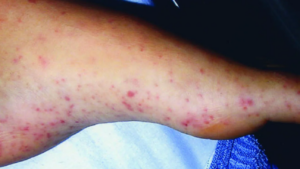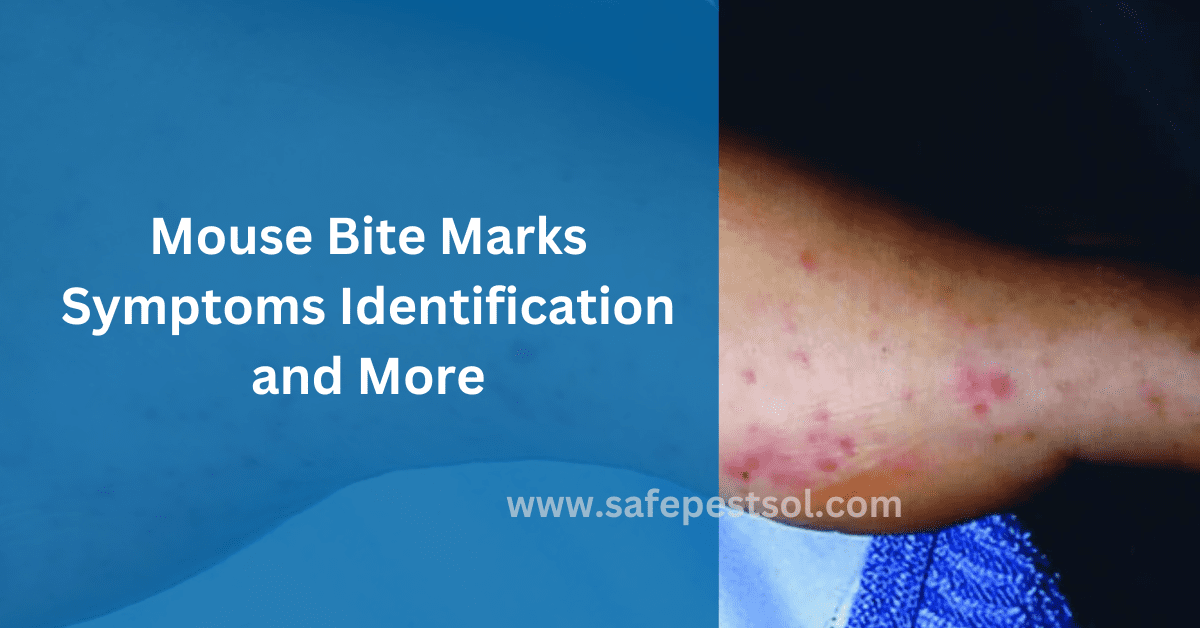Everything You Need to Know About Mouse Bite Marks
It is not common to get bitten by a mouse, but it usually occurs in areas where mouse or rodent infestation exists. The bites are small in size, but they can cause various health hazards. This is why knowing how to identify mouse bite marks, their symptoms, and ways to manage them will help you stay safe.
This guide will take you through easy steps to identify rodent bite marks and tips to prevent them.

Understanding Mouse Biting Behavior
Usually, mice are not aggressive creatures. Mostly, these small rodents only bite when they feel threatened, cornered, or mishandled. Mostly, rats bite into homes with infestations, and they enter in search of food. Rats mostly bite in homes where a mouse infestation exists.
They are because of the mice being forced into close contact with humans when seeking food or water sources. The majority of pet rats bite if handled roughly, while wild house mice or field mice bite if they feel that they have been cornered or trapped.
In rare cases, deer mice or other wild mouse species also bite. However, these species may bring serious disease by transmitting lymphocytic choriomeningitis. If rodent habitats are intense, human encounters become normal. In such cases, it becomes more essential to inspect rodent infestation to reduce the risk of bites, or other health threats.
How to Identify Mouse Bite Marks
Mouse bite marks are usually small and have the following characteristics:
- Tiny round punctures or holes on the skin.
- Redness or swelling around the affected area.
- Also look like insect bites but are smaller and more precise.
Proper identification becomes more essential because rodent bite marks may look like other insect bites. If you are in doubt, give priority to consult a medical professional.
Symptoms of Mouse Bite Marks
There are various symptoms of mouse bite injuries, which differs depending on the deepness of wound. While initial symptoms can be minor but it can develop into severe conditions if not treated properly. Below are some of the most common symptoms mentioned as per the different classifications.
1. Redness and Swelling Around the Wound
After a mouse bite, the bitten area becomes red and swollen as the body start responding to the injury and invasion of mouse saliva with bacteria. The swelling may start getting worse if you don’t clean it with care. Immediate washing with soap and water is a remedy for these symptoms to prevent any complications.
2. Itching and Irritation
Other typical signs after a mouse bite are itching and irritation. You may start feeling uncomfortable or itchiness around the affected area when it starts healing. Scratching the area may worsen the affected area and increase the risk of infection. If this condition continues, you should start caring more.
3. Signs of Infection
In few cases of a mouse bite, it leads to infection. Some of the symptoms could be pus formation, swelling, and continuous pain around the bite mark. You may also experience a fever in some cases which highlights that infection has spread into your body. Proper cleaning and early medical attention would reduce these symptoms from being severe.
4. Rat-Bite Fever
Mouse bites, in rare cases, may lead to rat-bite fever, a bacterial infection. Symptoms of rat-bite fever include an eruption, vomiting, and joint pains. Overlooking it can be severe. This is why it is important to seek medical attention to notice these symptoms and prevent any long-term health problems.
Is a Mouse Bite Dangerous?
Yes, a mouse bite can become a very dangerous health hazard if you don’t treat it properly. It may look nothing when a mouse bites, but bacteria present in the mouse’s saliva can lead to infections like rat-bite fever. Some of the most common mouse bit symptoms include rash and joint pains.
In very few cases, bites from deer mice may result in infections like lymphocytic choriomeningitis, which is a viral illness similar to the flu. If someone allergic gets bitten by a mouse, it becomes a must to get immediate medical attention.
What to Do If a Mouse Bites You
When a mouse bites, one should clean the wound using soap and water to remove saliva and reducing the chances of getting infected. You must disinfect the bitten area to ensure that bacteria must not grow there. Always note the affected area for any symptoms like for swelling fever or ongoing pain.
If you notice symptoms similar to rat-bite fever, you should seek prompt medical assistance and consult a professional pest control company to solve mouse infestation in your home.
How to Prevent Getting Bitten by Mice
You can start preventing mouse bites by maintaining a clean environment and eliminating entry points for mice to your home. You can also follow the strategies below to minimize mouse bites:
1. Control Mouse Infestations
One of the best ways to keep mouse away is to take early action against any infestations. Set traps to catch the these tiny pests and keep your space clean with visible mouse droppings avoid forming any nesting sites. Observing these signs can help you stopping the further invasions. However, in severe conditions, it is better to contact professional pest control services.
2. Seal Entry Points
Look around your home for any gnawed holes in the walls or furniture that can be entry points for mice. Seal them off with robust materials to prevent rodents from entering into your living spaces. Addressing these areas lowers the chances of mice infestations and accidental bites.
3. Secure Food Packaging
Food attracted mice to enter in homes. All food must be sealed in containers and crumbs or unsealed packaging should not be left opened. Storing food securely decrease any direct or indirect contact with pests but also reduces the chances of attracting rodents into the home.
4. Maintain Clean Furniture
Keep both inside and outside furniture clean since it discourages rodents from nesting. Field mice and deer mice usually hide under cluttered or dirty conditions. Cleaning regularly helps prevent nests and reduces the chances of bites from mice.
5. Use Professional Pest Control
Professional pest control is the best solution to reduce rodent infestation. Experts can find out hidden nests of rodent pests and eliminate them efficiently. Thus, this reduces the chances of accidental bites as well as keeping your house safe.
Conclusion
Mouse bites may seem minor, but they may cause a much bigger health risk if not treated properly. It is important to know how to assess, treat, and prevent rodent bites. The above mentioned details about mouse bites will help you protect yourself and your family from mouse bites. Most importantly, always remember to act immediately if you sense any mouse infestation to avoid further risks.
FAQs
1.What do mouse bite marks look like?
Mouse bite marks are usually small, mostly resembling tiny round punctures or chew marks, and often cause redness or swelling around the site.
2.Can a mouse bite cause an allergic reaction?
Yes, mouse saliva causes allergic effects to few people which cause damages like itching, swelling, or hives.
3.Should I worry about diseases from a mouse bite?
Yes, diseases like rat-bite fever and lymphocytic choriomeningitis can be transmitted through mouse bites, especially in rare cases. Seeking medical attention is recommended.
Safe Pest Sol: The Best Solution for Rat Infestation!
Having rat infestation in your home may bring several diseases, health risks and what not. So, are you dealing with bunch of rats around your place? Call us now and let our professional help you make your space protected from those tiny rats.

